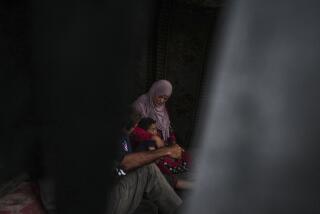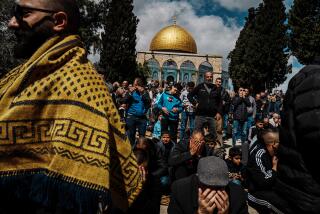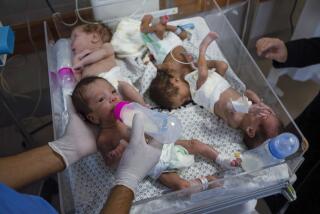Revolution might not be a cure for Egypt’s extreme poverty
- Share via
Reporting from Cairo — I returned to a country far different and very much the same.
When I first came to Egypt 35 years ago as a foreign correspondent, camels and sheep were still herded through the streets and there were few bridges over the Nile, so traffic was even worse than it is today. But more modern roads, which accommodate more cars, have brought pollution that stings the nostrils and often obscures the view of the city’s famed 1,000 minarets.
In those days, telephones not only did not connect to the outside world, they often didn’t work internally either, creating a powerful sense of isolation. Now all but the poorest of the poor have cellphones.
Tap water was a danger to the stomachs of foreigners and Egyptians alike, sewers often spilled into the streets, and electricity (when it was available) surged through the grid, frying any appliances that weren’t protected.
Massive U.S.-funded projects have eased those problems, but they cannot change the fact that the population of Egypt is double what it was when I first arrived.
The central Nile Delta, where the river forks to spread life-giving water and nutrients over a vast plain, has been transformed, shockingly. Once a bucolic green idyll where buffaloes powered water wheels in fields of onions and tomatoes and cabbages, it’s now a patchwork of small and large cities interspersed with fields here and there.
Gradually, Egypt’s ability to feed itself is being destroyed by construction making room for more mouths to feed.
Cairo has also mushroomed, reaching even the pyramids of Giza where I used to ride horseback almost daily. Whole new gated cities with names like Beverly Hills have been created where before there was only a duneless desert that stretched unbroken to Libya.
But some things have proved miserably unchanged.
Just off the Nile and not much more than a stone’s throw from Tahrir Square is Bulaq, a slum as dense as those of Kolkata. It is insulated from the world, even from Cairo, by its extreme poverty and tensions with a mostly Christian district just to the north.
I’ve been visiting Bulaq since I first came to Egypt, but only furtively, because the residents cannot imagine why a foreigner would come here, and because their pride does not want such poverty displayed to the outside world.
Tiny streets and even narrower alleys wind through a neighborhood teeming with life, men calling out from the taamia (falafel) and koshari (pasta) stands while boys play pool at tables arrayed in the streets.
Residents still live in three-story hovels made of bricks baked from mud that begin to return to mud during the occasional winter showers. Some entire families, like that of Ahmed Mohamad and his wife, Hoda, live in a single room and share a bathroom with perhaps nine other families.
Mohamad, 50, who lives on a courtyard away from the teeming alley where conversation would attract too much attention, insists that he remembers me from a previous visit. He says life has only gotten worse in Bulaq since I was here last.
As he speaks, the family’s most intimate clothing hangs from a balcony to dry next to a satellite television dish that provides soap operas and imams reciting Koranic verses. Homing pigeons raised for food fly from warrens on the rooftops. Starving cats beg for a morsel.
“Before, we were like a family here,” Mohamad said. “If someone couldn’t find food, we would give him some. But now the high prices have changed that.”
Tomatoes have gone from about 35 cents a pound several years ago to almost $1, and 6 pounds of garlic from 16 cents to $3, he said. The price of meat, already a rare treat, has tripled.
Hoda Mohamad said that thanks to rent-control laws, they still pay the same 10 Egyptian pounds, or $1.70 a month, they paid when they were married 25 years ago.
“I gave birth to four children in that room,” she said, nodding toward the upstairs, but now those rooms cost 500 pounds a month for new tenants and her two jobless sons cannot afford to get married.
Stone-throwing children suspicious of foreigners soon cut short the interviews in Bulaq, but the larger point is clear. If a yearning for political freedom was the instigator of the Egyptian revolution, poverty was what fueled it and made it too big to stop.
In the 35 years I’ve known Cairo, there has always been poverty. But until recently, there was at least enough food to go around.
The revolution is unlikely to reverse this trend anytime soon, which may presage mere disappointment, or more turmoil to come.
More to Read
Sign up for Essential California
The most important California stories and recommendations in your inbox every morning.
You may occasionally receive promotional content from the Los Angeles Times.














